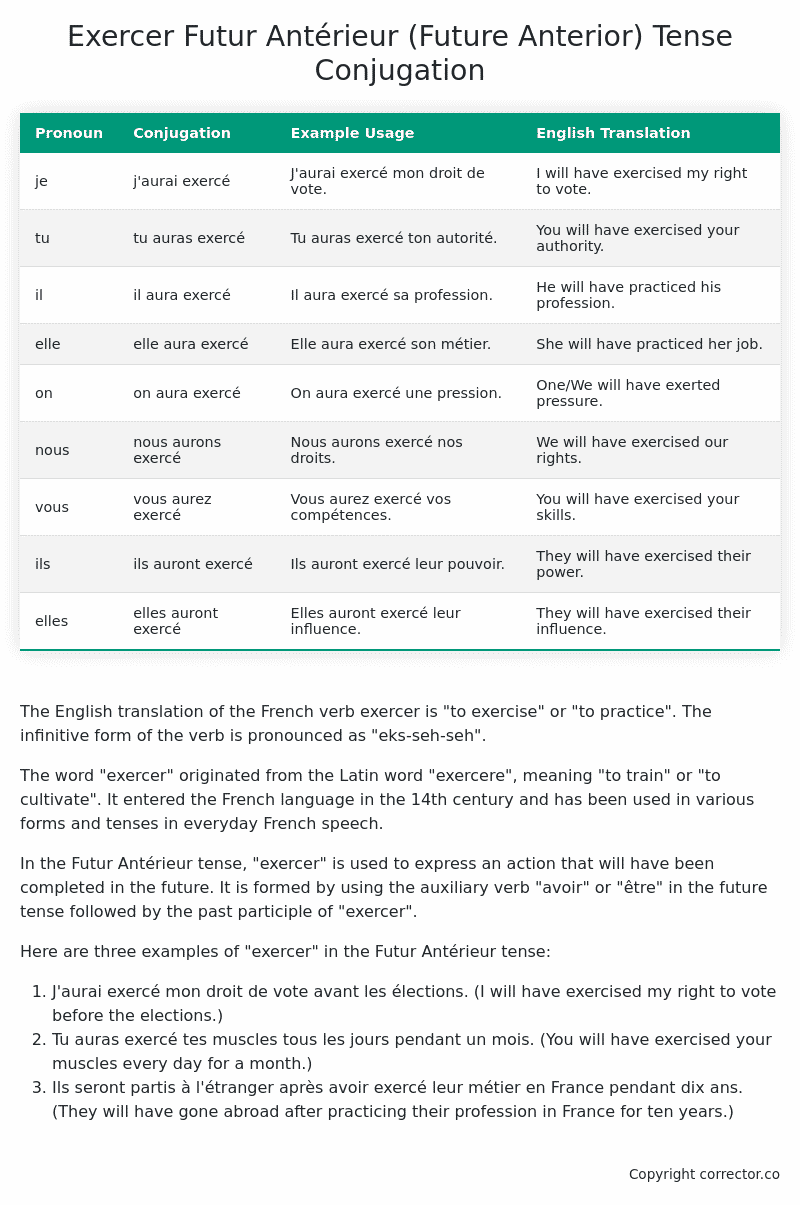Futur Antérieur (Future Anterior) Tense Conjugation of the French Verb exercer
Introduction to the verb exercer
The English translation of the French verb exercer is “to exercise” or “to practice”. The infinitive form of the verb is pronounced as “eks-seh-seh”.
The word “exercer” originated from the Latin word “exercere”, meaning “to train” or “to cultivate”. It entered the French language in the 14th century and has been used in various forms and tenses in everyday French speech.
In the Futur Antérieur tense, “exercer” is used to express an action that will have been completed in the future. It is formed by using the auxiliary verb “avoir” or “être” in the future tense followed by the past participle of “exercer”.
Here are three examples of “exercer” in the Futur Antérieur tense:
- J’aurai exercé mon droit de vote avant les élections. (I will have exercised my right to vote before the elections.)
- Tu auras exercé tes muscles tous les jours pendant un mois. (You will have exercised your muscles every day for a month.)
- Ils seront partis à l’étranger après avoir exercé leur métier en France pendant dix ans. (They will have gone abroad after practicing their profession in France for ten years.)
Table of the Futur Antérieur (Future Anterior) Tense Conjugation of exercer
| Pronoun | Conjugation | Example Usage | English Translation |
|---|---|---|---|
| je | j’aurai exercé | J’aurai exercé mon droit de vote. | I will have exercised my right to vote. |
| tu | tu auras exercé | Tu auras exercé ton autorité. | You will have exercised your authority. |
| il | il aura exercé | Il aura exercé sa profession. | He will have practiced his profession. |
| elle | elle aura exercé | Elle aura exercé son métier. | She will have practiced her job. |
| on | on aura exercé | On aura exercé une pression. | One/We will have exerted pressure. |
| nous | nous aurons exercé | Nous aurons exercé nos droits. | We will have exercised our rights. |
| vous | vous aurez exercé | Vous aurez exercé vos compétences. | You will have exercised your skills. |
| ils | ils auront exercé | Ils auront exercé leur pouvoir. | They will have exercised their power. |
| elles | elles auront exercé | Elles auront exercé leur influence. | They will have exercised their influence. |
Other Conjugations for Exercer.
Le Present (Present Tense) Conjugation of the French Verb exercer
Imparfait (Imperfect) Tense Conjugation of the French Verb exercer
Passé Simple (Simple Past) Tense Conjugation of the French Verb exercer
Passé Composé (Present Perfect) Tense Conjugation of the French Verb exercer
Futur Simple (Simple Future) Tense Conjugation of the French Verb exercer
Futur Proche (Near Future) Tense Conjugation of the French Verb exercer
Plus-que-parfait (Pluperfect) Tense Conjugation of the French Verb exercer
Passé Antérieur (Past Anterior) Tense Conjugation of the French Verb exercer
Futur Antérieur (Future Anterior) Tense Conjugation of the French Verb exercer (this article)
Subjonctif Présent (Subjunctive Present) Tense Conjugation of the French Verb exercer
Subjonctif Passé (Subjunctive Past) Tense Conjugation of the French Verb exercer
Subjonctif Imparfait (Subjunctive Imperfect) Tense Conjugation of the French Verb exercer
Subjonctif Plus-que-parfait (Subjunctive Pluperfect) Tense Conjugation of the French Verb exercer
Conditionnel Présent (Conditional Present) Tense Conjugation of the French Verb exercer
Conditionnel Passé (Conditional Past) Tense Conjugation of the French Verb exercer
L’impératif Présent (Imperative Present) Tense Conjugation of the French Verb exercer
L’infinitif Présent (Infinitive Present) Tense Conjugation of the French Verb exercer
Struggling with French verbs or the language in general? Why not use our free French Grammar Checker – no registration required!
Get a FREE Download Study Sheet of this Conjugation 🔥
Simply right click the image below, click “save image” and get your free reference for the exercer Futur Antérieur tense conjugation!

Exercer – About the French Futur Antérieur (Future Anterior) Tense
Construction
Common Everyday Usage Patterns
Interactions with Other Tenses
For example
Summary
I hope you enjoyed this article on the verb exercer. Still in a learning mood? Check out another TOTALLY random French verb conjugation!


